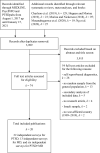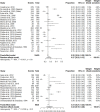Global burden of post-traumatic stress disorder and major depression in countries affected by war between 1989 and 2019: a systematic review and meta-analysis
- PMID: 34321235
- PMCID: PMC8319986
- DOI: 10.1136/bmjgh-2021-006303
Global burden of post-traumatic stress disorder and major depression in countries affected by war between 1989 and 2019: a systematic review and meta-analysis
Abstract
Objective: Extensive research has demonstrated high prevalences of post-traumatic stress disorder (PTSD) and major depression (MD) in war-surviving populations. However, absolute estimates are lacking, which may additionally inform policy making, research and healthcare. We aimed at estimating the absolute global prevalence and disease burden of adult survivors of recent wars (1989-2019) affected by PTSD and/or MD.
Methods: We conducted a systematic literature search and meta-analysis of interview-based epidemiological surveys assessing the prevalence of PTSD and/or MD in representative samples from countries with a recent war history (1989-2019). Drawing on the war definition and geo-referenced data of the Uppsala Conflict Database Programme and population estimates of the United Nations for 2019, we extrapolated the meta-analytic results to absolute global numbers of affected people. Drawing on disability-adjusted life years (DALYs) data of the Global Burden of Diseases Study 2019, we further calculated the PTSD-associated and MD-associated DALYs.
Results: Twenty-two surveys (N=15 420) for PTSD, 13 surveys for MD (N=9836) and six surveys on the comorbidity of PTSD and MD (N=1131) were included. Random effects meta-analyses yielded point prevalences of 26.51% for PTSD and 23.31% for MD. Of those affected by PTSD, 55.26% presented with comorbid MD. Prevalence rates were not significantly associated with war intensity and length, time since war, response rate or survey quality. The extrapolation yielded 316 million adult war-survivors globally who suffered from PTSD and/or MD in 2019. War-survivors were almost exclusively living in low/middle-income countries (LMICs) and carried a burden of 3 105 387 and 4 083 950 DALYs associated with PTSD and MD, respectively.
Conclusions: Since LMICs lack sufficient funding and qualified professionals to provide evidence-based psychological treatments for such large numbers of affected people, alternative and scalable strategies using existing resources in primary care and communities are required. Research is required to assist upscaling.
Keywords: epidemiology; mental health & psychiatry; public health; traumatology; treatment.
© Author(s) (or their employer(s)) 2021. Re-use permitted under CC BY-NC. No commercial re-use. See rights and permissions. Published by BMJ.
Conflict of interest statement
Competing interests: None declared.
Figures
References
-
- Morina N, Stam K, Pollet TV, et al. . Prevalence of depression and posttraumatic stress disorder in adult civilian survivors of war who stay in war-afflicted regions. A systematic review and meta-analysis of epidemiological studies. J Affect Disord 2018;239:328–38. 10.1016/j.jad.2018.07.027 - DOI - PubMed
-
- UCDP . Uppsala conflict data program (UCDP) conflict encyclopedia. Uppsala University, 2020.
Publication types
MeSH terms
LinkOut - more resources
Full Text Sources
Medical


